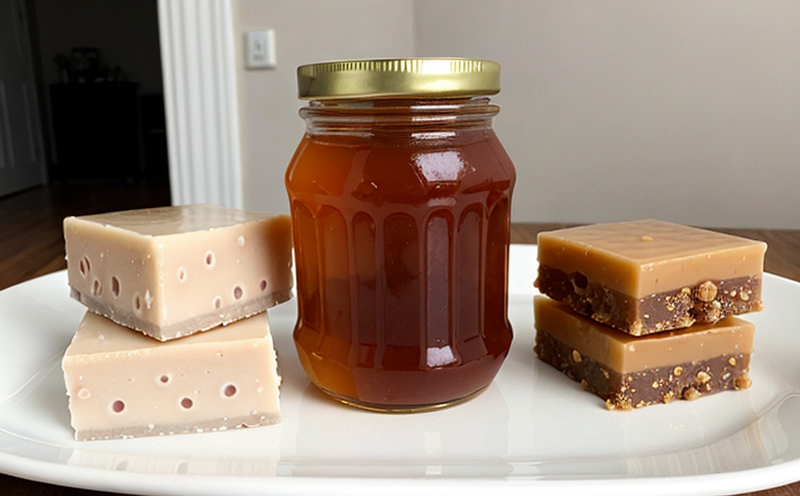ISO 12099 NIR Nutrient Profiling in Honey and Sweets
The International Organization for Standardization (ISO) has developed ISO 12099, a standard that provides a framework for near-infrared (NIR) spectroscopy-based nutrient profiling of honey and confectionery. This service is particularly valuable in the food and feed testing sector, where ensuring product quality, safety, and compliance with regulatory standards is paramount.
ISO 12099 addresses the complexity of analyzing various nutrients present in honey and sweets through NIR spectroscopy—a non-invasive technique that offers rapid analysis without altering the sample. The standard focuses on the determination of key nutrients such as sugars (glucose, fructose, sucrose), water content, ash, and protein levels in these products.
For quality managers, compliance officers, R&D engineers, and procurement personnel, this service ensures that honey and confectionery meet not only internal standards but also international benchmarks. By leveraging ISO 12099, laboratories can provide accurate nutrient profiles that are essential for product development, ingredient sourcing, and regulatory compliance.
The NIR spectroscopy technique used in this service is based on the principle that different chemical compounds absorb light at specific wavelengths. The instrument measures the light absorption patterns of the sample, which correspond to various components within it. This non-destructive method allows for rapid analysis without affecting the product's integrity or altering its nutritional profile.
The process begins with proper specimen preparation, which involves homogenizing the honey or confectionery samples to ensure consistent readings across all tests. The prepared specimens are then scanned using an NIR spectrometer, which captures spectral data that is later analyzed by specialized software to determine nutrient compositions accurately.
Once the analysis is complete, a comprehensive report detailing the nutrient profile of each sample is generated. This includes detailed information on sugars, water content, ash, and protein levels, among other parameters. Compliance with ISO 12099 ensures that these reports are precise and reliable, providing confidence in product quality.
This service is particularly beneficial for companies involved in the production or distribution of honey and confectionery products. It allows them to ensure consistent quality across batches, identify potential issues early on, and maintain compliance with international standards such as ISO 12099. The ability to produce accurate nutrient profiles through this method also enhances consumer trust and satisfaction.
Furthermore, by adhering to the strict guidelines of ISO 12099, laboratories can help reduce waste and optimize resource usage in the food industry. The non-invasive nature of NIR spectroscopy ensures that samples are not compromised during analysis, thereby preserving product integrity for subsequent tests or commercial use.
In conclusion, ISO 12099 NIR nutrient profiling is a critical service for ensuring the quality and safety of honey and confectionery products. It provides accurate, rapid, and non-invasive analysis, which is essential for maintaining compliance with international standards and enhancing consumer confidence.
Scope and Methodology
The scope of ISO 12099 NIR nutrient profiling encompasses the determination of key nutrients in honey and confectionery products using near-infrared spectroscopy. The standard focuses on analyzing parameters such as sugars (glucose, fructose, sucrose), water content, ash, and protein levels.
- Sample Preparation: Homogenization of samples to ensure consistent readings across all tests.
- Spectroscopy Analysis: Scanning the prepared specimens using an NIR spectrometer to capture spectral data.
- Data Processing: Specialized software processes the raw spectral data, correlating it with known nutrient compositions.
The methodology outlined in ISO 12099 ensures that the analysis is accurate and consistent across different laboratories. This consistency is crucial for maintaining high standards of product quality and ensuring compliance with international regulations. The use of NIR spectroscopy allows for rapid testing, reducing processing time significantly compared to traditional methods.
By adhering to the strict guidelines provided by ISO 12099, laboratories can produce reliable nutrient profiles that are essential for various applications within the food and feed industry. These profiles help in ensuring product quality, optimizing resource usage, and maintaining compliance with international standards such as ISO 12099.
Eurolab Advantages
At Eurolab, our commitment to excellence ensures that we provide the highest level of service for ISO 12099 NIR nutrient profiling in honey and confectionery. Here are some key advantages of working with us:
- Accreditation and Expertise: Our laboratory is fully accredited by relevant bodies, ensuring that our analyses meet the highest quality standards.
- Advanced Technology: We utilize state-of-the-art NIR spectrometers to ensure accurate and reliable results.
- Experienced Staff: Our team of experts has extensive experience in food testing, providing unparalleled expertise.
- Comprehensive Reporting: Detailed reports are provided for each sample analyzed, offering comprehensive insights into the nutrient profile.
- Timely Delivery: We ensure that results are delivered promptly, allowing for timely decision-making and action.
- Compliance with Standards: Our analyses adhere strictly to ISO 12099 guidelines, ensuring compliance with international standards.
The combination of our advanced technology, experienced staff, and strict adherence to international standards makes Eurolab the preferred choice for ISO 12099 NIR nutrient profiling in honey and confectionery. We are dedicated to providing accurate, reliable, and timely results that meet the needs of quality managers, compliance officers, R&D engineers, and procurement personnel.
Environmental and Sustainability Contributions
ISO 12099 NIR nutrient profiling in honey and confectionery significantly contributes to environmental sustainability by providing accurate and rapid analysis without compromising the integrity of the samples. This non-invasive technique ensures that no waste is generated during the testing process, thereby optimizing resource usage.
- Reduction in Sample Waste: The non-destructive nature of NIR spectroscopy means that samples remain intact after testing, preserving their quality for further use or analysis.
- Saving Time and Resources: The rapid processing time reduces the overall resource consumption associated with lengthy traditional methods.
- Consistent Quality Assurance: Accurate nutrient profiles ensure that products meet quality standards consistently, reducing the need for rework and waste.
By leveraging ISO 12099 NIR spectroscopy, laboratories can contribute to a more sustainable food industry. This service not only ensures product quality but also promotes efficient resource use and minimizes environmental impact. The ability to produce accurate nutrient profiles through this method enhances consumer trust and satisfaction while supporting environmental sustainability.





